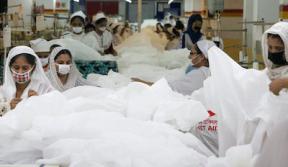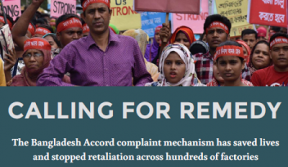Major U.S. apparel companies continue to put at risk the lives of the workers in South Asian factories who sew their clothing by covering up problems identified in confidential audits and ignoring best fire safety practices, according to a new report published today by the Washington, DC-based International Labor Rights Forum (ILRF).
In the wake of recent factory fires in Bangladesh and Pakistan that have killed hundreds of apparel workers, ILRF calls on apparel companies to put a stop to the epidemic of garment factory fires in South Asia by sharing their knowledge about workplace hazards openly, paying sufficient prices to factories for necessary building repairs, and respecting the voices of workers.
The 60-page report, titled Deadly Secrets, exposes how apparel companies are putting workers’ lives at risk by not publically sharing knowledge of fire hazards in their supplier factories.
Last month, 112 workers died in a garment factory fire in Bangladesh and two months prior 262 workers died in a garment factory fire in Pakistan. Both factories produced clothes for major western retailers. While these garment factory fires are the deadliest in both countries to date, they are part of a horrific trend. ILRF’s report shows that since 1990 over 1000 workers have died in preventable factory fires and other unsafe workplace incidents in Bangladesh alone. Over 700 of those deaths have occurred since 2005. Sixty percent of Bangladesh’s garment factories lack adequate fire-fighting tools and many factories do not have emergency exits.
Even though the death toll in Bangladesh’s export-oriented garment industry keeps rising, US apparel companies continue to send increasing numbers of orders to Bangladesh.
“The report calls for a new openness in the garment industry, where companies share what they know about dangerous workplaces and workers can speak up and organize to protect themselves,” said Bjorn Claeson, author of the report. “We are not there yet, but the Bangladesh Fire and Building Safety Agreement is a sign that change is possible. In the wake of the enormous tragedies at Tazreen Fashions and Ali Enterprises, let's seize the opportunity for action. Let's make sure the workers have not died in vain.”
“When workers report their safety concerns to management and visiting auditors, all too often they go unheard,” said Judy Gearhart, Executive Director of the International Labor Rights Forum. “Worker safety is a two-part problem: half building infrastructure and half whether or not workers’ voices are heard when they see safety risks or imminent danger. The programs of companies like Gap, JCPenney and Walmart ignore the key element of worker participation that is essential to saving lives.”
Although Bangladeshi law and codes of conduct of global brands and retailers guarantee workers’ right to organize and bargain collectively for better conditions, workers and worker advocates courageous enough to demand their rights often become targets of repression. They may face arbitrary detentions, arrests and criminal proceedings on the basis of spurious charges, and they sometimes endure beatings or threats to their physical safety. In April, labor organizer Aminul Islam was tortured and assassinated.
An increasing number of individuals and organizations are calling for all major apparel companies to join the independent Bangladesh Fire and Building Safety Agreement, which two large retailers have already adopted. Nearly 100,000 people have signed a petition on Change.org calling on Walmart, H&M and Gap to join the program. A similar petition on SumOfUs.org has generated over 200,000 signatures to Walmart, the major buyer of apparel from Tazreen Fashions which burned on November 24. These petitions were hand-delivered in actions at Gap and Walmart offices on December 14. This morning, Occupy Wall Street will wage a protest at the Port of Newark when a ship transporting Bangladeshi garments destined for Walmart is scheduled to dock. “Walmart - the world's largest employer and 1% corporation - refuses to take responsibility for this, compensate the families, or take any action to prevent needless deaths like this from happening again. The 1% must not profit from the workers' deaths in Bangladesh,” said Occupy Wall Street.

